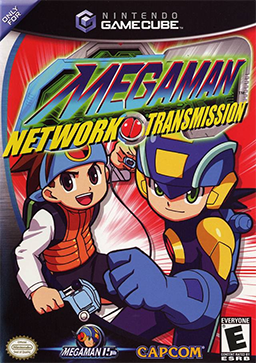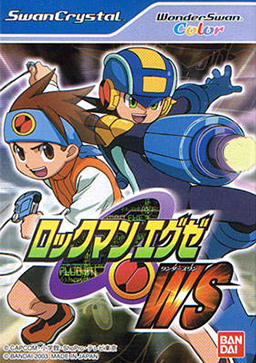Mega Man is a Japanese science fiction video game franchise created by Capcom, starring a series of characters each known by the name or moniker "Mega Man". The original game was released for the Nintendo Entertainment System in 1987, and spawned a franchise that expanded to over 50 games on multiple systems. As of October 2023, the series has sold 41 million units worldwide.

Mega Man 5 is an action-platform video game developed by Capcom for the Nintendo Entertainment System. It is the fifth game in the original Mega Man series and was released in Japan on December 4, 1992. It saw a release during the same month in North America and in 1993 in Europe.

Mega Man & Bass is an action-platform video game developed and published by Capcom. It is a spin-off game in the original Mega Man series and was originally released in Japan for the Super Famicom on April 24, 1998. It was later ported to the Game Boy Advance (GBA) handheld in 2002, and localized in English and released the following year.

MegaMan NT Warrior is an anime and manga series based on the Mega Man Battle Network series by Capcom, both using the same name but heavily diverging from each other in terms of plot. The manga series was written by Ryo Takamisaki and ran in Shogakukan's CoroCoro Comic between 2001 and 2006, while the anime television series, produced by Xebec, Nihon Ad Systems and TV Tokyo, ran for five seasons on TV Tokyo in Japan between March 2002 and September 2006, reaching 209 episodes in total, as well as a feature film. Viz Media would license the series for distribution in North America, including all the main chapters of the manga between 2004 and 2008, while the anime would only have its first season and Axess aired on Kids' WB! from 2003 to 2005.

Mega Man Network Transmission is a 2003 action-platform video game developed by Arika and published by Capcom for the GameCube video game console. The game was first released in Japan on March 6, 2003, and in North America and PAL regions the following June. Network Transmission is part of the Mega Man Battle Network series, which originated on the Game Boy Advance (GBA) handheld and takes place in an alternate timeline to the main Mega Man series.
Mega Man Battle Network is a tactical role-playing video game series created by Masahiro Yasuma and developed and published by Capcom as a spin-off of the Mega Man series; it premiered in 2001 on the Game Boy Advance and takes place in an alternate continuity where computers and networking technology was the main focus on scientific advancement, rather than robotics. There are a total of six mainline games, alongside several spin-offs.

Proto Man, known in Japan as Blues, is a fictional character from Capcom's Mega Man video game series. Proto Man first appeared in the 1990 video game Mega Man 3 as a mini-boss Mega Man had to face periodically, and was known as Break Man. At the end of Mega Man 3, it is revealed that Break Man's actual name is Proto Man, and that he is Mega Man's older brother. Proto Man made further appearances in many more Mega Man games, sometimes as a playable character, often receiving critical praise.

Mega Man Battle Network 2 is a 2001 tactical role-playing video game developed by Capcom for the Game Boy Advance (GBA) handheld game console. It is the second game in the Mega Man Battle Network series, and a sequel to the first game; it follows Lan Hikari and his NetNavi MegaMan.EXE as they attempt to take down the new NetCrime syndicate Gospel.

Mega Man Battle Network 3: Blue Version and Mega Man Battle Network 3: White Version are video games developed by Capcom for the Game Boy Advance (GBA) handheld game console. It is the third game in the Mega Man Battle Network series, released in 2002 in Japan and 2003 in North America. While in North America and Europe, two complementary versions of the game - Blue Version and White Version - exist, marketed simultaneously, this was not the case in Japan. The game was first released in a single version in this region. However, later a Black Version version containing bug fixes, new areas, optional bosses, and other improvements was released some months after the original. It was released on the Wii U's Virtual Console in Japan on December 17, 2014 and in North America on May 14, 2015.

Mega Man Battle Network 4 is a video game developed by Capcom for the Game Boy Advance (GBA) handheld game console. It is the fourth game in the Mega Man Battle Network series. The European version featured a completely different logo, which was also used on Mega Man X7, Mega Man X8, Mega Man Zero 2, Mega Man Zero 3, Mega Man Zero 4, Mega Man X: Command Mission, Mega Man Network Transmission, Mega Man Battle Chip Challenge, Mega Man Battle Network 3, and Mega Man Battle Network 5. Like Battle Network 3 before it, Battle Network 4 has two different versions, Red Sun and Blue Moon, that differ in story and gameplay details. Battle Network 4 is compatible with the e-Reader, and can be linked up with Rockman EXE 4.5 Real Operation and the Battle Chip Gate for NetBattles. It is able to link with Mega Man Zero 3, and contains references to Konami's Boktai series.

Mega Man Battle Chip Challenge, known in Japan as Rockman EXE Battle Chip GP, is a video game developed by Inti Creates and published by Capcom for the Game Boy Advance (GBA) handheld game console. It is a spin-off title in the Mega Man Battle Network series. The game saw a simultaneous August 8, 2003 release in Japan on the WonderSwan Color and Swan Crystal titled Rockman EXE N1 Battle. The GBA version was localized in North America and Europe the following March. The European version featured a completely different logo, which was also used on Mega Man X7, Mega Man X8, Mega Man X: Command Mission, Mega Man Zero 2, Mega Man Zero 3, Mega Man Zero 4, Mega Man Network Transmission, Mega Man Battle Network 3, Mega Man Battle Network 4, and Mega Man Battle Network 5. It was released on the Wii U's Virtual Console on July 30, 2014 in Japan, with both the North American and PAL region release occurring in August 2014.

Mega Man Battle Network is a role-playing video game developed by Capcom for the Game Boy Advance (GBA) handheld console. It is the first title of the Mega Man Battle Network series of games. It was originally released in Japan as a GBA launch game on March 21, 2001 and was released later that year in North America and Europe. It was also released via the Wii U Virtual Console in Japan on July 9, 2014, in Europe on July 24, 2014, and in North America on July 31, 2014.

Mega Man Battle Network 5: Team ProtoMan and Mega Man Battle Network 5: Team Colonel are 2004 role-playing video games developed and published by Capcom for the Game Boy Advance (GBA) handheld game console. Combined, they make up the fifth mainline installment in the Mega Man Battle Network series, and follows Lan Hikari and his NetNavi MegaMan.EXE, as they attempt to take down Nebula, who have kidnapped Lan's father and taken over the internet, with an anti-Nebula task force.

Rockman EXE WS is a platform video game, part of the Mega Man Battle Network subseries of Mega Man video games. The game was released on the WonderSwan Color, only in Japan. This game is a platformer like Mega Man Network Transmission, rather than a role-playing game.

Rockman EXE 4.5 Real Operation is a title in the Mega Man Battle Network sub-series of Mega Man video games. The game was released only in Japan on August 6, 2004, and is not part of the main Mega Man Battle Network storyline.

Rockman EXE Battle Chip Stadium is an arcade game in the Mega Man Battle Network sub-series of Mega Man games from Capcom. This game was not released outside Japan. Under the name of "Battle Station", the arcade game was featured a number of times in episodes of the Rockman EXE Beast+ anime series.

Mega Man Star Force: Pegasus, Mega Man Star Force: Leo, and Mega Man Star Force: Dragon are 2006 action role-playing video games developed and published by Capcom for the Nintendo DS handheld video game console; combined, they are the first game in the Mega Man Star Force series, a sub series of the greater Mega Man franchise—and a follow-up to the Mega Man Battle Network series. It takes place in the years of 220X, in which technology has advanced to the point where the world is now connected through EM waves. The game follows Geo Stelar, a fifth-grader in Echo Ridge who merges with an FM-ian named Omega-Xis after mourning the supposed death of his father.
Mega Man Legacy Collection is a series of video game compilations based on Capcom's Mega Man franchise. Each compilation features several playable video games from one of the Mega Man sub-series and adds new gameplay features and bonus content such as concept artwork. These compilations were developed internally at Capcom and were released between 2015–2023 for Nintendo Switch, PlayStation 4, Windows, and Xbox One, with the exception of the original Legacy Collection which was developed by Digital Eclipse and also released on Nintendo 3DS.
















